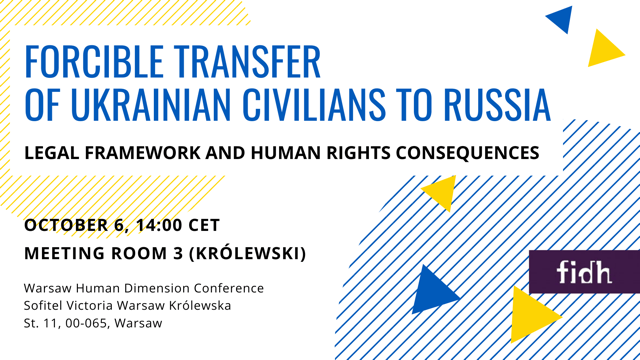Forced displacement, deportation and “filtration” camps are grave violation of IHL

On Thursday, October 6, 2022, as part of the Warsaw Human Dimension Conference, a panel discussion was held on the topic of forced displacement of Ukrainian civilians to Russia.
More than 2,490,000 Ukrainian civilians have been forcibly displaced to Russia since its full-scale invasion of Ukraine on February 24, 2022. Before entering Russia, a significant number of them pass through so-called “filtration camps” where civilians wait for days or months to undergo the “filtration” procedure, often in poor conditions and with insufficient food.
During the “filtration” process, civilians are often threatened or physically ill-treated. The “filtration measures”, are non-legal practice implemented by Russia in violation of the Geneva Conventions. In the filtration camps, people are searched and interrogated, men are stripped for tattoos, scars and calluses from carrying weapons. By doing so, occupiers hunted volunteers, and civil activists.
Such actions of the Russian army, which temporarily controls certain populated localities in the south, and east of Ukraine, show a desire to intimidate local residents who resist the occupation, persuade them to cooperate, and the intention to take revenge on Ukrainian activists, human rights activists and local leaders for their pro-Ukrainian stance.
Furthermore, Russia and its controlled criminal breakaway territories, quasi-entities (so-called “DPR” and “LPR”) illegally detain people in the occupied territories. Many are kidnapped, and taken from their homes, sometimes people simply disappear without a trace and later it becomes known that they are kept in one of the many isolators somewhere in the occupied territories of Russia or Belarus.
Forcibly displaced people often find themselves scattered across the cities of Russia with no money and no documents to return to Ukraine or to seek refuge in a third country. Cynically referred to as “evacuations” by the Russian authorities, involuntary displacement of civilians in fact is a forcible transfer or deportation in the Fourth Geneva Convention, violates international humanitarian law and may amount to war crimes.
The panelists focused on the legal framework of forced displacement, human rights consequences for displaced individuals, and ways to ensure respect for their rights and provide redress.
Moderation: Ilya Nuzov, International Federation for Human Rights
Speakers:
Yevgeniy Zakharov, Kharkiv Group for Human Rights Protection
Sasha Romantsova, Center for Civil Liberties
Svetlana Gannushkina, Civic Assistance Committee
Alexander Cherkasov, Memorial Human Rights Defence Centre
CCL reminds that the illegal detention and imprisonment of civilians in the so-called filtration camps is a systematic criminal activity of the Russian Federation. It has been conducting it in the occupied territories of Ukraine for eight years; the scope of the policy increased after the start of the full-scale invasion on February 24, 2022.
According to CCL preliminary estimates, from tens of thousands to hundreds of thousands of Ukrainians are being held in filtration camps or detention centers in Russian-occupied or Russian-occupied territories, which have turned into an organized and extensive system of institutions (the first filtration camps were during the British South African War to detain Boer men, women and children).
Background note:
The International Federation for Human Rights (French: Fédération internationale des ligues des droits de l’homme; FIDH) is a non-governmental federation for human rights organizations. Founded in 1922.
FIDH is nonpartisan, nonsectarian, and independent of any government. FIDH coordinates and supports collaborations with intergovernmental organizations including the European Union, Organization for Security and Cooperation in Europe (OSCE), Organization of American States, United Nations Development Programme, World Trade Organization, International Monetary Fund, World Bank, and Organisation for Economic Co-operation and Development.
FIDH’s mandate “is to contribute to the respect of all the rights defined in the Universal Declaration of Human Rights.” It aims to make “effective improvements in the protection of victims, the prevention of Human Rights violations and the sanction of their perpetrators.”

